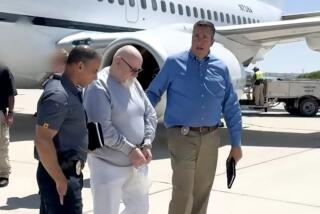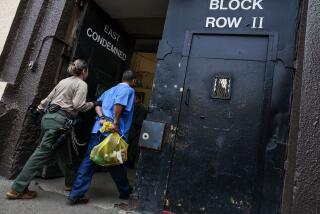Death row inmate wants governor to order testing of new evidence in Chino Hills murder case
Attorneys for a death row inmate convicted of a quadruple murder in Chino Hills say they’ve obtained new evidence that could prove the man’s innocence and are asking Gov. Jerry Brown to appoint a special master to reinvestigate the case.
Kevin Cooper has long fought his conviction for the slayings of three family members and a young boy in 1983, claiming that law enforcement planted evidence and ignored statements by witnesses pointing to alternate suspects in the killings.
His legal saga has attracted interest from judges and former prosecutors, including U.S. Sen. Kamala Harris, who’ve called on Brown to allow for advanced DNA testing of evidence in the case.
Cooper’s supporters, some of whom were spurred to action by a New York Times article about the case in May, have pointed to conflicting evidence in the case, including early witness statements that the attack was carried out by three white or Latino men. Cooper, now 60, is black.
In July, Brown said he would consider Cooper’s request to order additional forensic testing as part of the inmate’s bid for clemency. Cooper’s team says some key items recovered as part of the crime scene were never properly tested and should be analyzed using up-to-date DNA technology.
In a 34-page letter submitted to Brown on Friday, Cooper’s lead attorney, Norman C. Hile, said he has secured a DNA sample from a man he suspects of being the real killer and whose profile has not been inspected in the 1983 case. The man, a convicted murderer, is still alive but not currently incarcerated, Hile said.
Hile said he also has obtained three sworn declarations from people claiming to have personal knowledge of the alternate suspect’s involvement in the slayings. Hile doesn’t identify the declarants, citing safety concerns.
A prime piece of evidence in the case is a T-shirt with Cooper’s blood on it. After the blood was revealed to contain EDTA, a chemical used to preserve blood samples in police labs, Cooper’s team suggested the blood had been planted on the shirt.
Cooper’s lawyers now think they can identify the person who was wearing the T-shirt during the commission of the crimes by testing the collar and underarm areas using more sensitive and accurate methods. Lab analysis was last done in the case in 2002 and 2004.
Hile’s letter was in response to questions from Brown’s legal staff about what the additional forensic testing might reveal. A spokesman for Brown said Friday that the letter is being reviewed.
The San Bernardino County district attorney’s office sent a detailed memo to Brown in May refuting Cooper’s arguments and requesting that he be denied clemency.
On June 5, 1983, Doug and Peg Ryen, their 10-year-old daughter, Jessica, and an 11-year-old houseguest, Christopher Hughes, were found hacked and stabbed to death inside the Ryens’ home in Chino Hills.
The sole survivor of the attack was the Ryens’ 8-year-old son, Joshua, who suffered a slashed throat and fractured skull. The boy initially told a sheriff’s deputy and a social worker that his attackers were three white men, later saying he thought the killers were Latino.
Joshua Ryen clarified his account, saying that he had seen three men come to his house looking for work the night before the incident, but did not see three assailants, according to the district attorney’s memorandum. The survivor recently said he opposes any granting of clemency or further testing for Cooper, the document says.
Cooper escaped from a prison in Chino two days before the killings and had been hiding in a dwelling near the Ryens’ house. He had a long history of arrests but was never convicted of a violent offense until the quadruple murder, his attorneys say.
Cooper was convicted and sentenced to death in 1985. He lost his last appeal in 2009, when the U.S. Supreme Court refused to hear his case. He is being held at San Quentin State Prison.
Twitter: @mayalau
More to Read
Sign up for Essential California
The most important California stories and recommendations in your inbox every morning.
You may occasionally receive promotional content from the Los Angeles Times.











